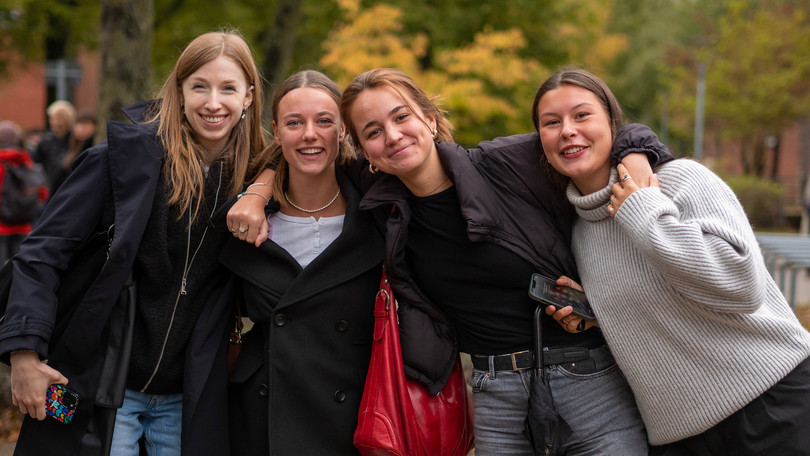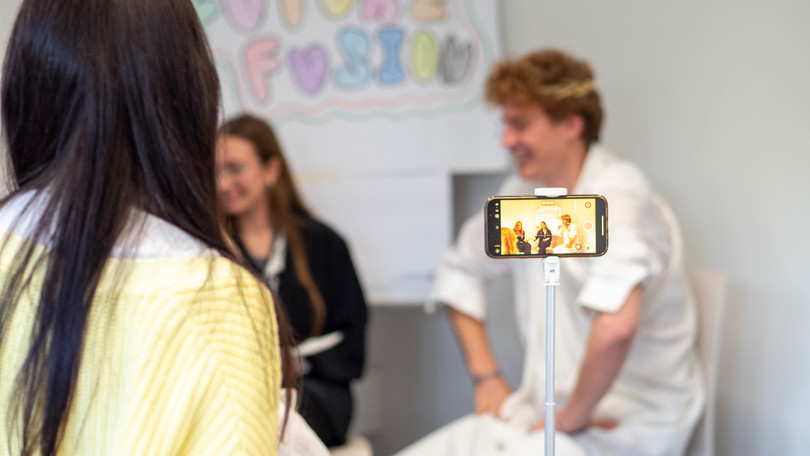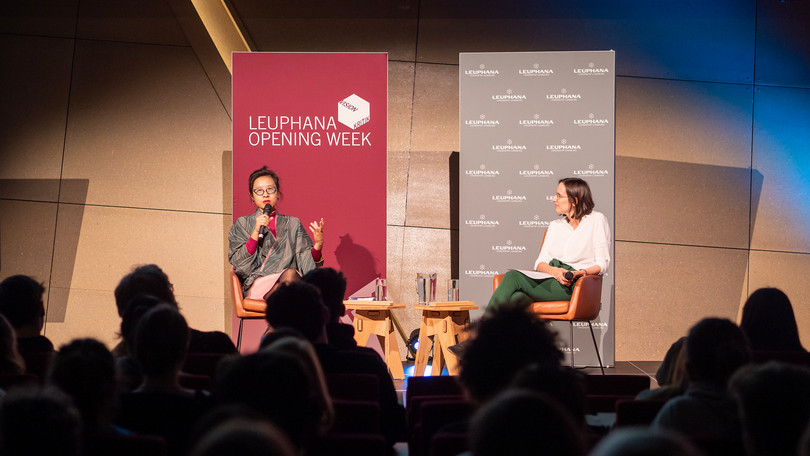First Semester at College
Your studies at Leuphana College begin with the Leuphana Semester, in which you will gain an introduction to science. By engaging with socially relevant topics, you will discover the value of science in your own individual way. You will also acquire your first subject-specific basics. The Opening Week marks the beginning of the Leuphana Semester and the Conference Week marks the end.
What can you expect in the Leuphana semester?
Important dates
- Pre-courses
- 3 to 26 September 2025: Language and Orientation Programme
- 1 to 10 October 2025: Opening Week
- 13 October 2025: Beginning of lecture period
- 25 to 27 February 2026: Conference Week
Registering for courses
Checklist for Leuphana Semester 2025/26
Important notes
Six weeks before the beginning of lectures, the course catalogue is published on myStudy, Leuphana’s web-based student portal. You need to set up an account in order to be able to access the course catalogue. On the portal home page you will find a user’s guide for students which will show you how to set up your account.
In general, course registration is activated on myStudy at the beginning of October. Places in compulsory lectures are assigned using a list procedure without participant limitation. Spaces in lectures with a limited number of seats can be assigned using a random selection procedure. You have the opportunity to apply for a place in these lectures during the two random selection phases.
We recommend taking a look at the general examination regulations for your course of study as well as the associated subject-specific schedules when creating your timetable. You can find the relevant guidelines on which modules need to be completed there.
Support during registration
During the Opening Week the First Semester Tutorial helps you with registering for courses.
Opening Week. The first joint task
Your studies at Leuphana College begin with the Opening Week. During this week, you will work together with other first-year students on a current topic – accompanied by experienced experts from academia and practice. This not only gives you a first impression of academic work, but also shows you how closely research, social commitment and education are linked at Leuphana College.
Methods Module
In the methods module, you will learn the basics of scientific work. Together with your year group, you will deal with scientific theory, qualitative and quantitative methods and their significance for research and society.
What is the methods lecture about?
- Critically categorising methods
- Understanding different research approaches
- Clearly structuring complex content - an important skill for your entire degree course.
Module Director
- Prof. Dr. Henrik von Wehrden
Module Coordinator
- Elisabeth Frank
DataX module
In the DATAx module, you will learn how to work with data and AI: You will program with Python, analyse data and gain initial insights into machine learning. It's not just about technology, but also about the social impact of data & AI – in business, culture, politics and everyday life.
The DATAx module comprises a LECTURE and EXERCISE – combined as a blended learning format. This means: you prepare flexibly online (with texts, videos and interactive Jupyter notebooks via Moodle and the DATAx Hub) and deepen your knowledge together in the face-to-face sessions.
What is the DATAx lecture about?
- Key terms and concepts from data and AI literacy
What is the exercise about?
- directly implementing what you have learnt
- developing your own solutions
- reflecting on the opportunities and challenges of responsible data use
Module Directors
- Prof. Dr. Burkhardt Funk
- Prof. Dr. Ricardo Usbeck
Module Coordinator
- Bennet Etsiwah
Transformation module
In the transformation module, you will deal with the question of how we want to live together as a society – today and in the future. To do this, you will look at social changes from different perspectives: historical, cultural, scientific and future-oriented. This always involves responsibility – in action, thought and research – and the role of science in social change processes.
What is the Transformation lecture about?
- Overview of key topics and contexts
- Historical developments
- Current challenges
What is the exercise about?
- Understanding the theories and models from the lecture
- Further developing the ability to reflect
- Fundamentals of scientific work (e.g. formulating questions & dealing with scientific literature)
What is the seminar about?
- Applying what you have learnt in practice
- Working on your own small research project
- Better understanding current social problems and developing possible solutions
Module Directors
- Prof. Dr. Daniel Fischer
- Prof. Dr. Roberto Nigro
Module Coordinators
- Dr. Lina Bürgener
- Dr. Laura Picht-Wiggering
- Leonie Schmitt
Subject-specific modules: Introduction & methods
In the introduction module, you will receive an introduction to the content of your specialisation. Over the course of the first semester, you will gain an insight into your personal specialisation and an overview of the related subject areas. At the same time, you will learn how to apply the knowledge acquired in the interdisciplinary modules to specific subject areas.
In the methods module (subject-specific), you will learn which methods you need to master in your major/subjects. This gives you an overview of the methods in the first semester and allows you to practise applying them.
Study specialisations at the College
- Business Information Systems (GER)
- Cultural Studies (GER)
- Cultural Studies: Organization, Society, and the Arts (ENG)
- Digital Media (ENG)
- Economics (ENG)
- Engineering (GER)
- Environmental Sciences (GER)
- Global Environmental and Sustainability Studies (ENG)
- International Business Administration & Entrepreneurship (ENG)
- Law (GER)
- Political Science (GER)
- Psychology (ENG)
- Social Education (GER)
- Studium Individuale (ENG)
- Teaching and Learning (GER)
Conference Week at Leuphana College
Showing what can be achieved together
The Conference Week is the finale of the Leuphana Semester. Here you compile your findings from the project seminars in the transformation module, present your results and discuss them with an interested audience. In addition, guests from civil society, politics and academia come to Leuphana to discuss the topics of the Conference Week with you.
Contact & Counseling
Initial Information
Information Office (Infoportal)
Building 8, ground floor
Universitätsallee 1, 21335 Lüneburg
Phone +49.4131.677-2277
Fax +49.4131.677-1430
studierendenservice@leuphana.de
Opening hours
Term time & term break:
Mon - Thu 9 a.m. - 4 p.m.
Fr 9 - 12 a.m.
Arrange an appointment
College's Student Counselling Service
Building 8, ground floor
Universitätsallee 1, 21335 Lüneburg
Open Consultation Hours
Wed 11 – 13 h (on campus)
Thu 16 – 18 h (via Zoom)




